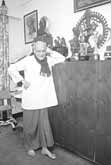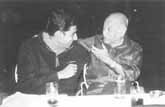
GRANDFATHER INC.
 One has always caught him on screen as the affable old man, with a feeble voice and a comely face... From Sholay (1975) to Shararat (releasing on July 12), veteran character artiste, A. K. HANGAL, has come a long way in Bollywood but neither has his social status nor looks changed one bit. After doing theatre for 60 years and being featured in over 250 films, "the irony of fate is that I am still living in a rented, one-room tenement," he says in a free-wheeling chat with HUBERT VAZ at his residence at Santacruz.
One has always caught him on screen as the affable old man, with a feeble voice and a comely face... From Sholay (1975) to Shararat (releasing on July 12), veteran character artiste, A. K. HANGAL, has come a long way in Bollywood but neither has his social status nor looks changed one bit. After doing theatre for 60 years and being featured in over 250 films, "the irony of fate is that I am still living in a rented, one-room tenement," he says in a free-wheeling chat with HUBERT VAZ at his residence at Santacruz.
"...Jaante ho, sansar ka sabse bada boj kya hota hain? Baapke kandho par bete ka janaza..." who can forget that sterling dialogue delivered by A. K. Hangal in his quivering, feeble voice, in an emotionally charged scene of the all-time hit Sholay. Not only did he win the hearts of the people of 'Ramgadh' (in the film) but he also won the hearts of the audience at Minerva theatre, where the film was first screened.
Whether it was the role of 'Imam chacha' in Sholay or 'Shambu kaka' in Lagaan, a henpecked husband in Bawarchi or an infatuated old man in Shaukeen, veteran character artiste, A. K. Hangal, always delivered the goods. And, producers love to cast him in their films, not only because of his friendly screen presence or his being a disciplined artiste but also because he's cheap to hire.
"It seems many producers have exploited my 'simple way of living and high thinking,' - as they say. They try to reduce my price, after making a fool of me. But, I've become cleverer now, at the fag end of my life. It's a bit late, but I don't bother much as the aim of my life is not earning more and more money but social progress...," that's how 85-year-old Mr. Hangal sums up his existence and involvement in films.
When we called on this 'perpetual grandfather on screen' at his simple residence on the ground floor of 'Saraswati Mansion' in Santacruz, Mr. Hangal was ready for the interview dressed in a beige kurta, rust coloured loongi and a scarlet muffler around his neck. Without wasting a second, he invited us directly to take a peek into his past, and even prepared a brief summary of his sojourn as an actor. We only had to wait a couple of seconds to allow him neatly comb his grey strands in place and then, clicking his fingers fast, he beckoned us to shoot forth our queries.
He chose to settle in a chair in his favourite corner with a lamp on (this is very good for your picture, he told the photographer), a shabby album of memorable pictures in hand and constantly harping on the fact that it was his disciplined lifestyle, punctuality and down-to-earth thinking that has sailed him through.
 The room was dim and covered with various trophies and mementos he had been honoured with over the past six decades for his performances on screen as well as stage. "I've not won any awards, these are all private trophies. There's a lot of manipulation involved for national awards or else I'd have bagged many," he blurts out angrily as we chose to shift our focus to his entry in the Indian film industry.
The room was dim and covered with various trophies and mementos he had been honoured with over the past six decades for his performances on screen as well as stage. "I've not won any awards, these are all private trophies. There's a lot of manipulation involved for national awards or else I'd have bagged many," he blurts out angrily as we chose to shift our focus to his entry in the Indian film industry.
Beginning at the age when most artistes retire (50 plus), Mr. Hangal, who hails from a family of Kashmiri pandits, did his first film, Mahabharat in Peshawar (now part of Pakistan). In fact, he is related to the illustrious Nehru family. Kamala Nehru (Jawaharlal Nehru's wife) and his mother were first cousins, which makes him a cousin of late prime minister Indira Gandhi.
Reminiscing about the past, he said, "From Mahabharat to Shararat, it has been a very long journey. But, I've changed my style of acting after every decade for the growing intelligence of the audience," he said adding that the audience can no longer stomach illogical scenes or performances in a film.
"I started as a 'loud actor' and passed through the natural phase and the realistic stage," he said, then tilting his head (as he always does on screen), added, "there's a difference between natural and realistic. Natural is something like photography - static - while realistic is a moving character, evolving through more and more experiences, analysing society, political happenings and their effect on society because any character is a part of society. So, what I am doing today is more difficult."
His real life behaviour somewhat reflects his roles in films and that has also been the essence of his autobiography which had been published three years ago in English, Hindi and Marathi.
"I've taken part in 50 plays and 250 films during my 60 years (35 years in films) in performing arts. But, the irony of fate is that I'm still living in a one-room, rented tenement," he said, sort of admitting that he let such a situation come to pass by not being too demanding. Today, character artistes quote high sums, he said hoping to toe their line henceforth.
The man who has acted in numerous films with stars like Amitabh Bachchan and Jaya Bhaduri is now acting with their son, Abhishek, in Shararat where he plays the role of an inmate of an old age home along with a host of character artistes. "It's a very interesting, humourous and emotional film, you must see it," he insists.
Incidentally, Mr. Hangal featured in Jaya's first film Guddi as well as Amitabh's first, Saat Hindustani and both enjoy a good rapport with him all through the years, he said adding with a mischievous grin, "I told Abhishek, I have worked for decades with your parents and I'd like to work with your children as well.
Having seen the rise and rise of Bollywood over the past decades, Mr. Hangal laments that there never was any feeling of professionalism in Indian film making and it is absent even today. In the West, film-making is a more disciplined, organised and systematic craft. "I have worked in a few foreign films and I feel they are more organised and I prefer their style of work since I am very systematic and organised myself.
As for the change in the industry over the years, the technological progress is immense and films are made in a better way today, he said adding that, however, while the format has developed a lot, the content is weak today. Bollywood has been ascribed the status of an industry but it remains just a phrase on paper. Industrialisation in its real sense would see the emergence of more organised, systematic, punctual and committed work from film makers as well as artistes, he added.
Work apart, when asked what was the secret behind his appearance which has remained unchanged for a few decades, he has a hearty laugh. "First of all, I give credit to my parents who brought me into this world. They have left a big haveli (referring to his body) for me. I only maintain it. But I'm a vegetarian (though I do take drinks) and I follow a disciplined lifestyle without harming anyone and seeking the good of others. This is my secret," he said.
Even at 85, Mr. Hangal conducts himself about with quite a confident gait. He is still working for a couple of new films and doesn't yet feel the time's come to take a little rest. In fact, he did meet with an accident on the sets of Lagaan at Bhuj (in Gujarat) wherein he developed a slip-disc problem and has to wear a supporting belt around his waist.
Mr. Hangal lives alone since his wife, Manorama, died about 25 years ago. His only son, Vijay Hangal, who is a talented cameraman, also lost his wife early and lives alone next door. In fact, the two look like brothers. "What difference can you expect between us because I married at the age of 18..." he asserts and adds that he spends all his lonely moments either reading or listening to ghazals.
Having worked with some of the finest directors in India, Hrishikesh Mukherjee, Basu Bhattacharya, Raj Kapoor, Shyam Benegal, Govind Nihalani, and some of the finest male and female stars, there's little Mr. Hangal can aspire for, but he believes in blending his talent with social service. He has always portrayed positive roles as well as taken part in a string of peace movements. "I have participated in the freedom struggle, gone to jail, etc. The aim of my life is to see people progress in peace."
Two direct questions before we decide to let him enjoy his leisure hours and have his lunch on time:
What is it about Bollywood that you like the most and hate the most? His answers were to the point. "I like the cosmopolitan, non-communal work atmosphere in this industry while I hate the gossip indulged in by the artistes themselves as well as the media."
What is the best part of growing old? He got up to his feet and in his characteristic quivering voice said "Never oppose nature. Birth, growth and death are natural. One should never try to oppose them. One cannot. You should try to flow with life as it goes ahead..."